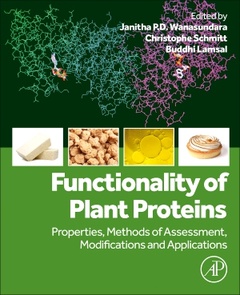Functionality of Plant Proteins Properties, Methods of Assessment, Modifications and Applications
Coordonnateurs : Wanasundara Janitha P.D., Schmitt Christophe, Lamsal Buddhi

Functionality of Food Proteins: Mechanisms, Modifications, Methods of Assessment and Applications provides researchers and users of plant-based proteins with the latest developments on their functionality at the molecular and ingredient level, and in food applications. The book discusses the biological, chemical and physical principles behind the techno-functional and nutritional properties of proteins, existing methods of functionality assessment, and protein modification for functional enhancement. With market demand for protein ingredients, several lesser known sources are being utilized to develop new protein ingredients and products, with some intended to replace, partially or wholly, traditional proteins such as egg, milk, meat, soy and vital gluten.
Depending on the source and processing into ingredients, the ability of these proteins to satisfy techno-functional and nutritional requirements in the final food product may differ. Science-based knowledge is needed in the area of protein functionality for making decisions along the value chain, from production on the land to processing and formulation.
1. Proteins of plant sources and fundamentals of protein product development
2. Processing of protein ingredients from plant sources
3. Functionality of plant proteins and importance of aggregation state
4. Probing structure-function relationship of proteins with molecular modeling
SECTION II. Methods of plant protein processing
5. Hydrodynamic properties I: Protein-water interactions; solubility, wettability, dispersibility, water binding/adsorption
6. Hydrodynamic properties II: Protein-water-Protein interaction; Viscosity and Gelation
7. The interfacial activity of plant proteins: theory, assessment and application in emulsion development
8. Hydrophobic/hydrophilic surface activity II: Foaming properties (air/water interface stabilization)
9. Hydrophobic/hydrophilic surface activity III: Interactions with other micro- and macro- molecules
10. Protein complexation with carbohydrates and lipids
11. Nutritional properties: Protein quality assessment parameters and methods
SECTION III. Functionality of proteins
12. Enzymatic modification of plant proteins: influence on functional properties, allergenicity, and bioactivity
13. Physical modification
SECTION IV. Protein functionality in food applications
14. Plant proteins for dry extruded products
15. Plant proteins for meat analogues
16. Plant proteins for dairy analogues
SECTION V. Challenges for plant-based protein ingredients and future path
17. Allergenicity of plant proteins
18. Anti-nutritional factors (ANFs) in protein-rich plant products: Chemistry, occurrence, nutritional implications, and their analysis
19. Challenges of plant protein processing and protein ingredient functionality assessment
Dr. Christophe Schmitt is a Protein Expert Scientist at Nestlé Research Lausanne, Switzerland. He holds a doctorate in Biotechnology and Food Processing and has contributed over 150 peer reviewed publications, book chapters and presentations in the area of food protein structure and functionality. He is co-inventor of more than 60 patent applications in the field of protein functionality applied to food and serves the advisory board of several plant-based foods and proteins projects and global initiatives.
Dr. Buddhi Lamsal is a Professor at the Food Science and Human Nutrition Department, Iowa State University. He holds a Doctorate in Agricultural Engineering with food processing emphasis from University of Wisconsin- Madison, WI. He has contributed over 90 peer reviewed journal publications, several book chapters and presentations in the area of plant protein extraction processes, their impact on protein quality and broader range of ingredient functionalit
- Provides fundamentals of the properties that contribute to functionality (nutritional and techno-functional properties) of proteins in food systems and their relationship to protein molecular structure
- Describes fundamentals of the assessment of functional properties of protein with existing definitions and food systems
- Explores fundamentals of modification strategies employed to alter nutritional and techno-functional properties to enhance value of proteins in food
- Includes examples of plant protein-based products (in food systems) in which the role of nutritional and techno-functional properties is described
Date de parution : 07-2024
Ouvrage de 500 p.
19x23.4 cm
Thèmes de Functionality of Plant Proteins :
Mots-clés :
Protein molecule; phyico-chemical property relationship; model systems in vitro; surface properties; foaming; emulsification; gelation; colour; adhesion and cohesion; extrudability; hydrolysis; cross-linking; pressure force; shear force; esterification; acylation; glycation; phosphorylation; plant protein; meat protein



